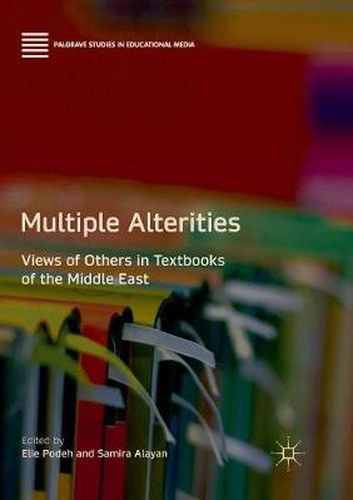Readings Newsletter
Become a Readings Member to make your shopping experience even easier.
Sign in or sign up for free!
You’re not far away from qualifying for FREE standard shipping within Australia
You’ve qualified for FREE standard shipping within Australia
The cart is loading…






This title is printed to order. This book may have been self-published. If so, we cannot guarantee the quality of the content. In the main most books will have gone through the editing process however some may not. We therefore suggest that you be aware of this before ordering this book. If in doubt check either the author or publisher’s details as we are unable to accept any returns unless they are faulty. Please contact us if you have any questions.
This book highlights and examines the role of the textbook in legitimising established political and social orders. It analyses the way in which the ‘other’ is presented in school textbooks, focusing on a number of countries in the Middle East and North Africa (MENA) region, and argues that the role of textbooks in developing and maintaining a national identity should be afforded greater critical attention. Textbooks can help form national identities by developing a society’s collective memory; this might involve a historical narrative which may be self-contradictory or even fabricated to a certain extent, including myths, symbols and collective memories that divide us from them , and ultimately resulting a dichotomy between the Self and the Other. As well as addressing a range of theoretical questions relating to the study of textbooks generally, the volume also covers a broad spectrum of Middle Eastern states and societies, with contributions from Turkey, Iran, Egypt, Cyprus, Lebanon, Iraq, Kurdistan, Jordan, Morocco, Tunisia, Israel and Palestine. It will be essential reading for researchers and students working in the fields of Education, Sociology and History, particularly those with an interest in national identities in the MENA region.
$9.00 standard shipping within Australia
FREE standard shipping within Australia for orders over $100.00
Express & International shipping calculated at checkout
This title is printed to order. This book may have been self-published. If so, we cannot guarantee the quality of the content. In the main most books will have gone through the editing process however some may not. We therefore suggest that you be aware of this before ordering this book. If in doubt check either the author or publisher’s details as we are unable to accept any returns unless they are faulty. Please contact us if you have any questions.
This book highlights and examines the role of the textbook in legitimising established political and social orders. It analyses the way in which the ‘other’ is presented in school textbooks, focusing on a number of countries in the Middle East and North Africa (MENA) region, and argues that the role of textbooks in developing and maintaining a national identity should be afforded greater critical attention. Textbooks can help form national identities by developing a society’s collective memory; this might involve a historical narrative which may be self-contradictory or even fabricated to a certain extent, including myths, symbols and collective memories that divide us from them , and ultimately resulting a dichotomy between the Self and the Other. As well as addressing a range of theoretical questions relating to the study of textbooks generally, the volume also covers a broad spectrum of Middle Eastern states and societies, with contributions from Turkey, Iran, Egypt, Cyprus, Lebanon, Iraq, Kurdistan, Jordan, Morocco, Tunisia, Israel and Palestine. It will be essential reading for researchers and students working in the fields of Education, Sociology and History, particularly those with an interest in national identities in the MENA region.